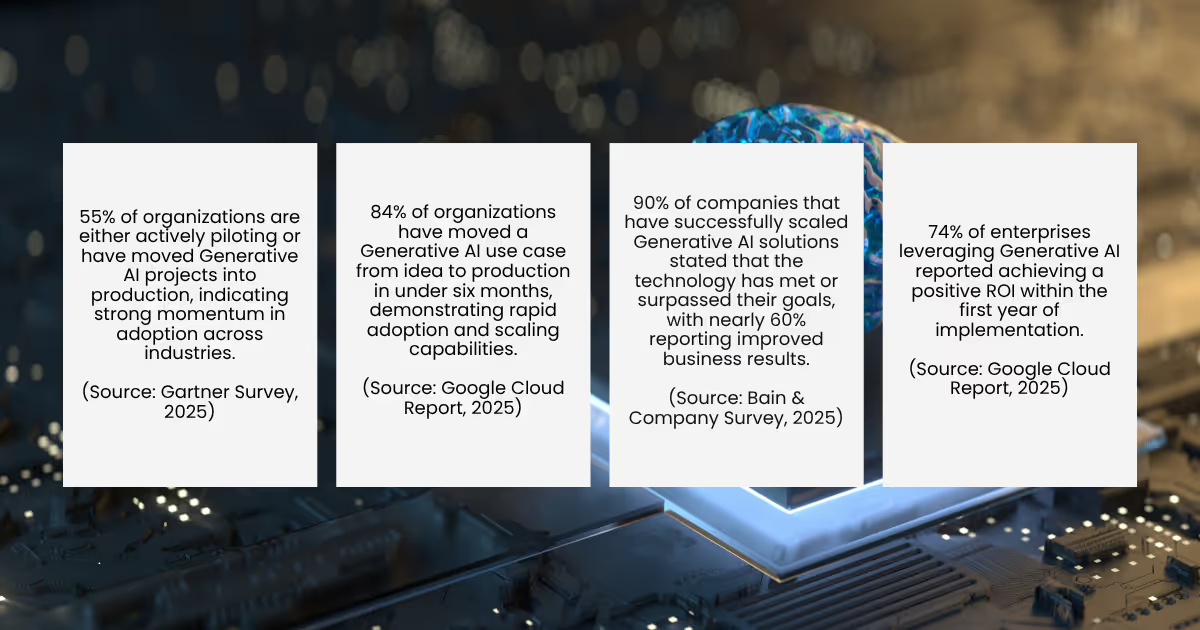Why Pilot GenAI Projects Are the Smartest Way to Adopt Generative AI in Your Organization

The surge of interest in Generative AI (GenAI) has prompted organizations across industries to explore its applications, with sectors like healthcare using GenAI for diagnostic support and pharmaceutical research, and financial services leveraging it for fraud detection and personalized customer experiences. However, the path to meaningful GenAI adoption is fraught with uncertainty: How this transformative technology can drive innovation, productivity, and customer engagement? How do we ensure ROI? Is our data infrastructure ready? Will employees actually use the solutions?
For many enterprises, the smartest and safest way to answer these questions is to start small with a focused, well-scoped pilot project.
What is a GenAI Pilot Project?
A Generative AI pilot project is a short-term, low-risk initiative designed to test a specific use case using GenAI technologies. Typically lasting 4 to 8 weeks, a pilot delivers a Minimum Viable Product (MVP) that stakeholders can interact with, evaluate, and iterate upon. Rather than committing to a full-scale AI transformation, organizations use pilot projects as experimental sandboxes to:
- Validate business use cases
- Test technical feasibility
- Assess data quality and availability
- Evaluate user engagement
- Estimate return on investment
Strategic Benefits of Running a GenAI Pilot
- Risk Mitigation
Pilot projects allow organizations to test GenAI concepts without heavy investment. This de-risks the adoption process and provides empirical evidence before scaling. - ROI Validation
By testing in a controlled setting, businesses can measure the real impact. For example, a 25% reduction in customer service response time or a 30% boost in marketing content throughput, helping justify further investment on efficiency, cost savings, or customer satisfaction, helping justify further investment. - Stakeholder Alignment
Functional prototypes make it easier to secure buy-in from leadership, department heads, and end-users who need to see value to support adoption. - Technical Readiness Assessment
Pilots reveal gaps in data quality, infrastructure, and integration, offering insights into what needs to be improved before scaling. - Faster Innovation Cycles
Lean, focused experiments accelerate the learning curve and promote a culture of iterative innovation.
2025 Industry Insights: Positive Outcomes from Generative AI Pilots
Current industry data highlights the growing success organizations are experiencing with Generative AI pilots and subsequent scaling efforts in 2025.

These positive metrics validate the strategic importance of starting with pilot projects to de-risk investments, measure impact, and align stakeholders effectively.
Popular GenAI Use Cases for Pilot Projects
- Customer Support Copilots: Automate responses or assist agents using conversational AI
- Document Summarization: Summarize long-form content, research, or contracts using LLMs
- RAG Systems: Build Retrieval-Augmented Generation tools to surface relevant knowledge from enterprise data
- Code Generation: Assist engineering teams with auto-generated code snippets or documentation
- Marketing Automation: Create on-brand marketing content or email copy at scale
Scaling from Pilot to Production: The Next Step
Launching a successful pilot is only the beginning. For instance, a retail company piloted a GenAI-powered chatbot to handle customer inquiries. In just six weeks, they observed a 40% reduction in support tickets and a significant boost in customer satisfaction. Encouraged by these results, the company scaled the solution across their global customer service operations, integrating it with CRM and support platforms for seamless performance. This transition was successful because the pilot had clear KPIs, stakeholder alignment, and a roadmap for system integration and training. Turning an MVP into a production-grade system involves:
- Performance Monitoring: Track KPIs to measure continued relevance and effectiveness
- MLOps Implementation: Automate training, deployment, and monitoring of AI models
- System Integration: Ensure compatibility with existing enterprise tools and workflows
- User Enablement: Provide training, documentation, and support for end-users
- Governance and Compliance: Implement safeguards to meet ethical, legal, and organizational requirements
To avoid stagnation, it is crucial to plan the post-pilot transition from the start—complete with budget forecasts, stakeholder responsibilities, and technical roadmaps.
How Fission Labs Supports Your GenAI Journey
Fission Labs brings deep expertise in developing AI solutions that begin with high-impact pilot projects and evolve into enterprise-grade systems. Our GenAI adoption model includes:
- Use Case Discovery: Joint workshops to define the most promising pilot opportunities
- Accelerated MVP Builds: Sprints of 4–6 weeks to launch testable solutions quickly
- Prebuilt Accelerators: Ready-to-deploy RAG, summarization, and chatbot frameworks
- Cloud-Agnostic Deployment: Options across AWS, Azure, GCP, or on-prem infrastructure
- Scalability Planning: Strategic guidance and support to move from pilot to full production
With 15+years of custom software development experience and on-demand AI/ML expertise, Fission Labs is uniquely positioned to help organizations mitigate risk while unlocking the full potential of Generative AI.
Think Big, Start Small
The road to AI maturity begins with a single, well-executed experiment, and those who start today will lead tomorrow. Start with a focused use case, validate the impact, and plan for scalable success.
Schedule a discovery session with our team or download our free "GenAI Pilot Planning Guide" to get started.



